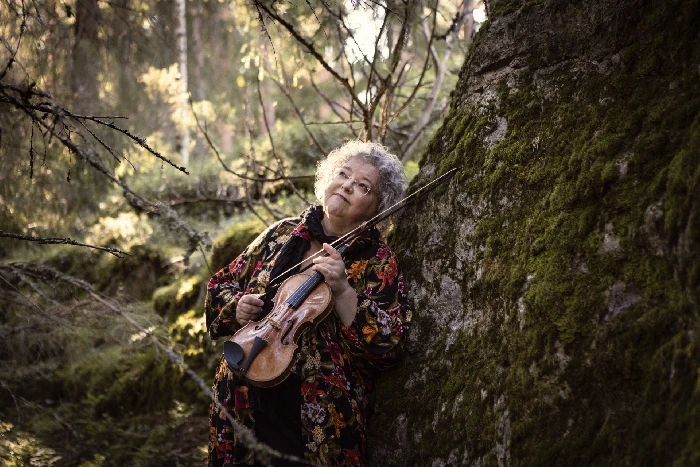
Photo: Ulla Nisonen
Kreeta-Maria Kentala
Violinist Kreeta-Maria Kentala is a pioneer in the Finnish movement for early music. She’s at home as a soloist, a leader and a pedagogue of Baroque, Classical, Romantic music as well as folk music. She regularly gives concerts as a solo artist, a member of chamber music projects, and as a soloist, concertmaster and orchestra leader.
Kreeta-Maria studied violin in the Central Ostrobothnia school of music with esteemed teachers such as Mauno Järvelä, Juha Kangas and Kaija Saarikettu. From there she advanced to Sibelius Academy and on to Edsberg music school to Jennifer and Endre Wolf’s class. A master class arranged at Edsberg introduced her to Reinhard Goebel, whom she followed to Cologne to study Baroque music. Kreeta-Maria also studied Baroque music on various master classes and collaborative projects under the guidance of Baroque violinist Monica Huggett.
In the course of her career Kreeta-Maria has had the opportunity to work as an orchestra musician in the Finnish Radio Symphony Orchestra and as a Baroque musician in the Musica Antiqua Köln ensemble. Kreeta-Maria is also active as a pedagogue – it seems a passion for teaching is a hereditary trait in her family. She’s very much in demand as a trainer for orchestral musicians and instrument pedagogues, especially in the musical styles of Baroque, Classicism and early Romantic era. Previously Kreeta-Maria as also worked as a lecturer for violin in the Länsi-Helsinki school of music and as a Baroque music lecturer in the Sibelius Academy. She has also taught musicians specializing in Baroque music in Centria, Pietarsaari University of Applied Sciences.
Kreeta-Maria has many different concert programmes for different line-ups from intimate duo up to large scale orchestra. One of Kreeta-Maria’s favourite tasks is drawing up and playing concert repertoire consisting of unknown composers and music that rarely gets performed. She also loves merging different genres together: Baroque goes very well together with folk music or a brand new modern piece of music. From 2019 until 2021 Kreeta-Maria will work as the artistic director of the Oulunsalo soi festival.
Recordings Kreeta-Maria has made as a chamber musician and a soloist have gathered great acclaim in Finland and abroad. She’s received three Emma Awards, a Janne Award from the Finnish AV producers and two the Album of the Year awards of the Finnish Broadcasting Company YLE. In the year 2016 The Arts Promotion Centre Finland granted Kreeta-Maria a five-year artist grant for the years 2017–2021 and in May 2019 she became a nominee for the Nordic Council Music Prize 2019. Her work was also awarded by Finnish Early Music Association as she was given the “The Early Music Act of 2019” commendment. Kreeta-Maria is also the recipient of a two-year artist grant from the Finnish Cultural Foundation for the years 2023-2025
As a Kaustinen-born folk musician from both her mother and her father’s side, Kreeta-Maria has played folk music from a very early age, and the highly active musical life in her hometown is close to Kreeta-Maria’s heart. She was the artistic leader of the Kaustinen Chamber Music Week in the years 2010-2012 and president and board member of Kaustisen Folk Musician Association in the years 2013-2020.
Artist's/Ensemble's own website